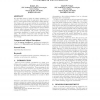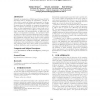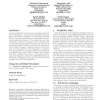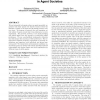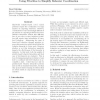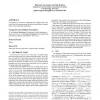107
Voted
ATAL
2007
Springer
15 years 7 months ago
2007
Springer
In this paper we develop a novel probabilistic model of computational trust that explicitly deals with correlated multi-dimensional contracts. Our starting point is to consider an...
ATAL
2007
Springer
15 years 7 months ago
2007
Springer
For embodied agents to engage in realistic multiparty conversation, they must stand in appropriate places with respect to other agents and the environment. When these factors chan...
123
Voted
ATAL
2007
Springer
15 years 7 months ago
2007
Springer
Research on organization of Multi-Agent Systems (M.A.S.) has shown that by adapting its organization, a M.A.S. is better able to operate in dynamic environments. In this paper we ...
ATAL
2007
Springer
15 years 7 months ago
2007
Springer
In many settings Web services are now perceived as the first choice technology to provide neatly encapsulated functionality for Web-based computation. To date, many standards hav...
83
Voted
ATAL
2007
Springer
15 years 7 months ago
2007
Springer
We are interested in domains where an agent repeatedly negotiates with other agents over shared resources where the demand or utility to the agent for the shared resources vary ov...
ATAL
2007
Springer
15 years 7 months ago
2007
Springer
Real-world behavior-based robot control problems require the coordination of a large number of competing behaviors. However, coordination becomes increasingly difficult as the num...
117
Voted
ATAL
2007
Springer
15 years 7 months ago
2007
Springer
In Service-Oriented MAS middle-agents provide different kinds of matchmaking functionalities. If no adequate services are available for a specific request, a planning functionalit...
102
Voted
ATAL
2007
Springer
15 years 7 months ago
2007
Springer
We propose an extension of alternating-time temporal logic, that can be used for reasoning about the behavior and abilities of agents under various rationality assumptions. Catego...
ATAL
2007
Springer
15 years 7 months ago
2007
Springer
Diagrammatic methodologies for the representation of agent interaction protocols can be classified as joint representations that describe an interaction in terms of a single sequ...
98
Voted
ATAL
2007
Springer
15 years 7 months ago
2007
Springer
This paper proposes programming constructs to improve the practical application of existing BDI-based agent-oriented programming languages that have formal semantics. The proposed...

